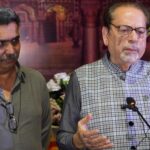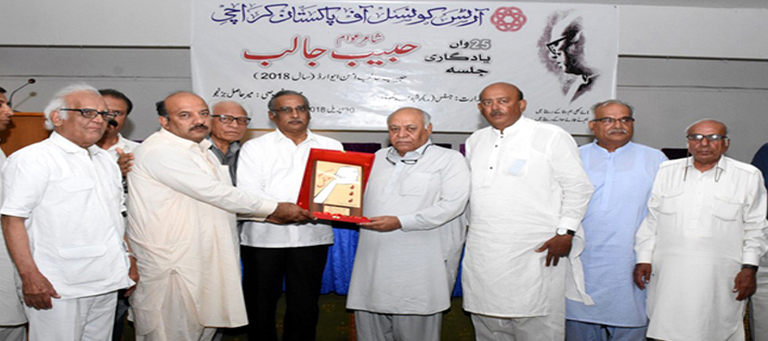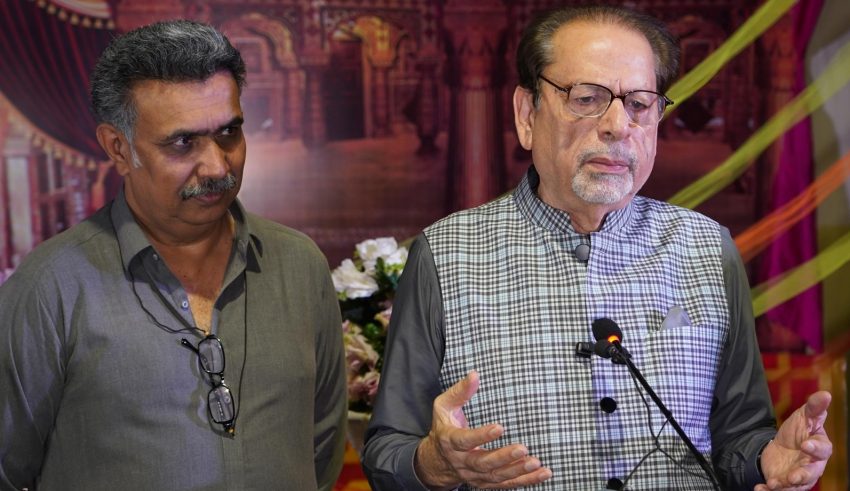Senator Mir Hasil Bizenjo, who was the chief guest on the occasion, said individuals such as Jalib do not need anyone’s appreciation. Jalib was a great person because he was a great political worker. History has proved him right. 
Mr Bizenjo reminisced about the time after the fall of Dhaka when Jalib was in Lahore discussing the issue with a bunch of friends. The rulers at the time had still not accepted the formation of Bangladesh. But Jalib and his friends thought otherwise and went out into the streets saying we should accept the new country. But they were terribly beaten up by the people in the streets.
Mr Bizenjo said Jalib didn’t care who he was up against. Once in front of Akbar Bugti, who was the governor of Balochistan at the time, he read out a couplet against the politician. Jalib led a political struggle which was the reason he had joined the National Awami Party. He loved workers and labourers. The three eras of the poet — ’60s, ’70s and ’80s — had made him even a more powerful man in 2018 as the high and mighty now recited his verses. Jalib, Mir Gul Khan Naseer and Faiz weren’t just poets, they were revolutionaries. Jalib was distinct because in his struggle for the working class, he never thought about his own well-being or his children’s.
He loved workers and labourers. The three eras of the poet — ’60s, ’70s and ’80s — had made him even a more powerful man in 2018 as the high and mighty now recited his verses. Jalib, Mir Gul Khan Naseer and Faiz weren’t just poets, they were revolutionaries. Jalib was distinct because in his struggle for the working class, he never thought about his own well-being or his children’s.
Retired Justice Rasheed A. Razvi in his presidential address said that both Jalib and Saqi had sacrificed a lot for their cause. He argued that throughout his life he had been hearing that one should support the lesser evil [to support a bigger cause]. He told the audience that he was coming from an event where the NSF [National Students Federation] had been revived after 15 years and hoped that it would steer the student community towards a progressive trend. He insisted that time had come to resist the forces of the status quo. 
Muslim Shamim shed light on the art of Habib Jalib. He said if there were similarities between the poet’s personality and his work, then it’s bound to create great art. Jalib’s poetry and personality were the same. His poems spoke of truth which is the reason he became legendary in his lifetime.
Karamat Ali said Jalib took part in practical politics. Going down memory lane, he said when he was, in the 1970s, working as an apprentice of the great artist Sadequain in Lahore, Jalib and writer Munnu Bhai were the two people who used to regularly visit the painter and indulge in lively socio-political debates. Sadequain was a staunch Marxist. Karamat Ali urged that we now need a labour movement and should think about it on a broader scale.
Aqeel Abbas Jafri read out a paper in which he drew a sketch of Jam Saqi’s life and work.
Ramzan Ahmed said if Shahbaz Sharif was reciting Jalib’s verses, then it’s the victory of the poet. Both Jalib and Saqi were in love with the workers.
Manzoor Razi said Jalib wrote against every ruler that held sway over the country. He also recited the poet’s famous poem ‘Main nahin maanta, main nahin jaanta’.
Tauqeer Chughtai paid a tribute to Jam Saqi in verse.
Habib Jalib’s son Nasir Jalib said Jam Saqi spoke against those in power in difficult times. He also quoted one of his father’s couplets:
Zarre hi sahi koh se takra to gaey hum
Dil le ke sar-i-arsa-i-gham aa to gaey hum
[I am a mere speck, but have fought with a mountain
I have brought my heart into the land of sorrow]
Ghulam Akbar, Umar Baloch, Nasir Mansoor, Sheikh Majeed, Dr Jabbar Khattak and Faisal Edhi also spoke. Saeed Pervaiz, secretary of the Habib Jalib Peace Award Committee, conducted the programme.
It will do a great service to Jalib’s memory when the next time Mr Pervaiz organises such an event, instead of calling on more than a dozen speakers, he invites a few personalities who can speak on Jalib’s life and poetry eloquently.
(Thanks Dawn)
Picture Gallery:












